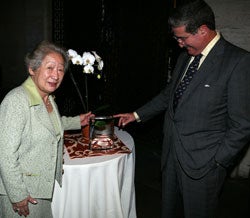Post Date: October 22, 2005
Following the announcement on October 6 that Sadako Ogata, the former United Nations high commissioner for refugees, is the winner of the 2005 Great Negotiator Award, this week Ogata came to Harvard Law School to receive the award and speak to the HLS community. Ogata was recognized by the Program on Negotiation for her international negotiation work, which helped save the lives of hundreds of thousands of civilians displaced as a result of internal bloodshed in the Kurdish area of Iraq, the Balkans, Afghanistan and the African Great Lakes region that includes Rwanda.
The annual award was created six years ago by PON to recognize an individual whose achievements in the field of negotiation and dispute resolution have had a profound and lasting impact.
Elected by the UN General Assembly to her high commissioner post, Ogata’s work began on January 1, 1991, at age 64. She was later reelected for two more three-year terms.
Dubbed “The silver-haired dynamo” by Business Week, Ogata can claim a trio of firsts: she is the first woman, academic, and Japanese citizen to hold this position. In addition, she was the first head of a humanitarian agency to address the UN Security Council and the first to meet with a U.S. president and his secretary of defense.
During her nine years at the UN, she dealt with the aftermath of the Cold War, as thousands of refugees attempted to return home. Charged with mobilizing massive humanitarian efforts on an unprecedented scale, Ogata is credited with improving the UNHCR’s responsiveness to crises around the world through countless negotiations that kept refugees safe, fed, sheltered and, in many cases, repatriated.
“Before she got the letter to be our honoree, Mrs. Ogata hadn’t thought of herself as a negotiator,” said Professor Robert Mnookin, PON chair. “I think that we have persuaded her that not only is she a great negotiator, but that she is among the best.”
Among her achievements was reaching out to “internally displaced persons,” who were technically not protected under UNHCR’s mandate; strictly speaking, it applied only to those who fled beyond their nation’s borders.
Working in active war zones, she often had to scramble for military protection, not only for refugees but for her staff and herself. She has said that humanitarian problems require more than humanitarian solutions, and that politics, not just aid, needs to be part of the solution. This belief led her to reach out to groups such as the military, which are not traditionally approached by relief workers.
When introducing Ogata at the dinner, Professor James Sebenius of Harvard Business School noted that she had no military power and was working without legal sanction. “How do you get people to do something they don’t want to do and with no leverage?” he asked. “Mrs. Ogata created something out of whole cloth.”
Sebenius went on to say that “there might have been a different outcome for refugees under a different UNHCR leader who was more by the book and less resourceful. I think had we had such a person, tens of thousands, if not hundreds of thousands, would not be alive today and millions would have suffered unbearably.”
“Looking back,” said Ogata during her acceptance speech, “I realized that much of our efforts in serving refugees actually consisted of constantly negotiating with bad or difficult people. . .To fulfill the mandate of protecting the refugees, like it or not, we had to deal with bad people who controlled the areas from which refugees were expelled or to which they had fled.”
Earlier in the day, Ogata answered questions from students and faculty at Harvard Law School in a panel discussion about negotiation and conflict resolution.
Ogata joins a growing roster of notable negotiators. Last year, the Great Negotiator Award was given to Richard Holbrooke, the former U.S. ambassador to the United Nations. Other past recipients were Stuart Eizenstat, the former U.S. ambassador to the European Union (2003), Lakhdar Brahimi, the U.N.’s special envoy for Afghanistan (2002), Charlene Barshefsky, U.S. trade representative during the Clinton administration (2001), and former U.S. Senator George Mitchell (2000).
The Program on Negotiation is a leading research center committed to improving the theory and practice of negotiation and dispute resolution. It is a consortium of faculty, students and staff from Harvard University, Massachusetts Institute of Technology, Tufts University and other Boston area universities. PON provides education and training, conducts research, and works to increase public understanding of successful negotiation and conflict management practices.
– Sally Abrahms
